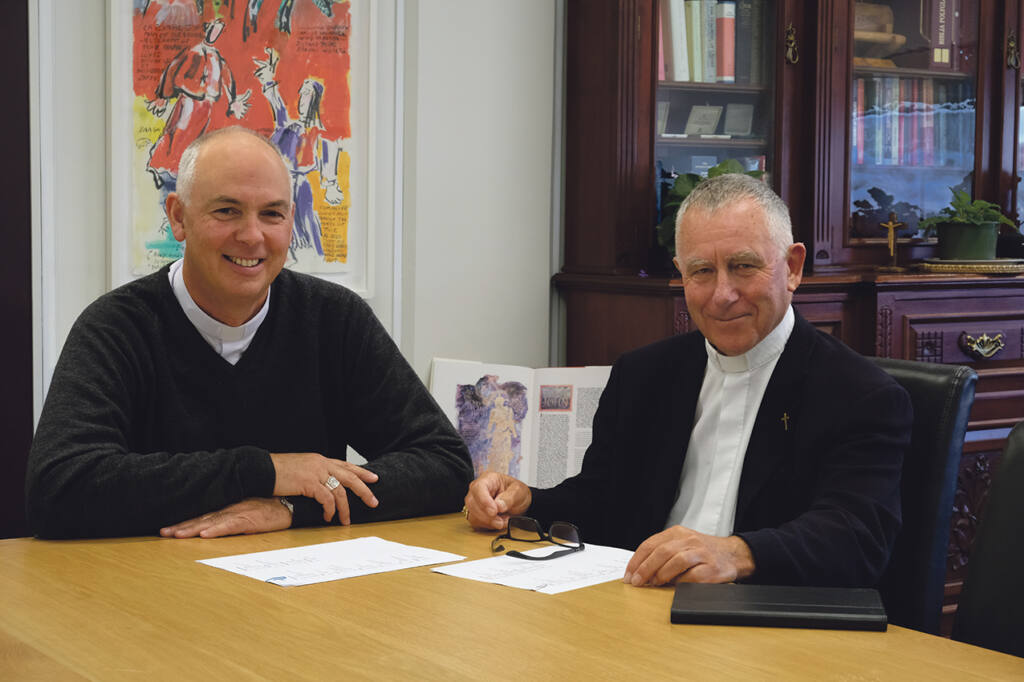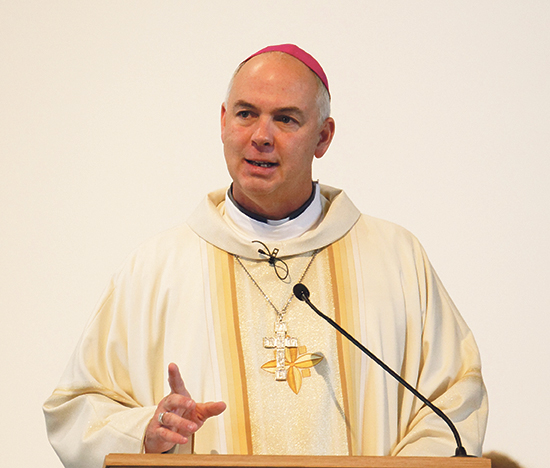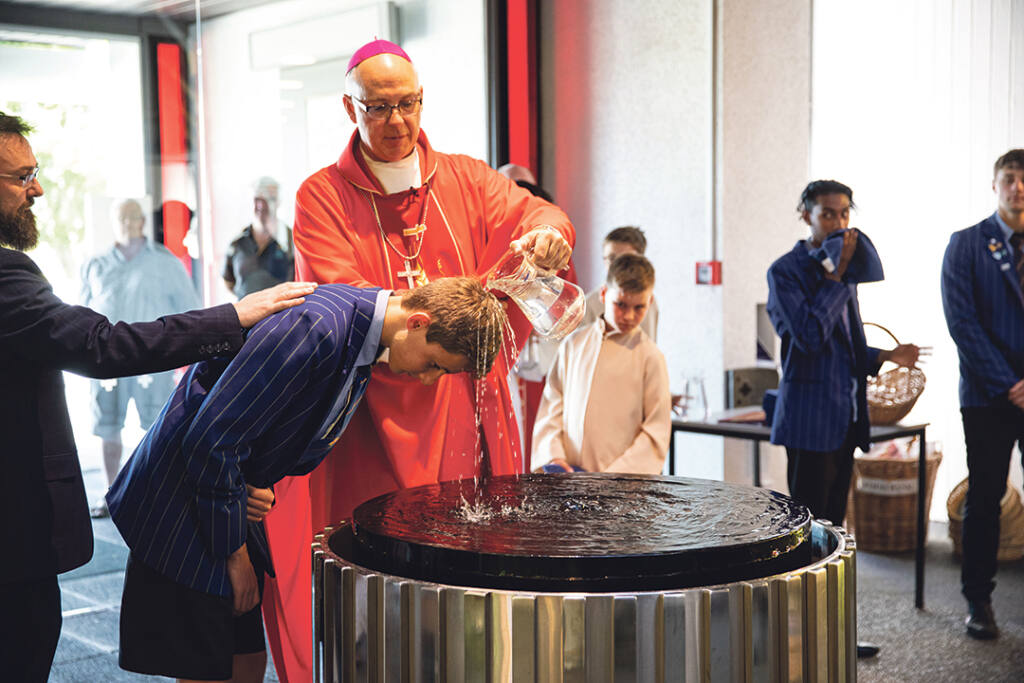Published in WelCom February 2021

Michael Fitzsimons
When Fr Paul Martin SM was a teacher at St Patrick’s College, Wellington, he commented, ‘I think people need to have a job that makes them work hard and come home tired.’
With his appointment as Bishop of Christchurch and now Coadjutor Archbishop of Wellington, he has found a job like that. Or as he comments with a laugh, ‘It found me!’
Being appointed Coadjutor Archbishop at the beginning of January was a total surprise to him, having been Bishop of Christchurch for less than three years. That appointment was a surprise too. Being coadjutor bishop, unlike an auxiliary bishop, means he has the right of succession when Cardinal John Dew retires.
The appointment comes into effect immediately but until a successor is found in Christchurch, Archbishop Paul will be the Apostolic Administrator for the Christchurch Diocese. He will have a foot in both dioceses during the transitional phase.
‘I’ve enjoyed my time in Christchurch. Like any role, it has its challenges but it is a real privilege to have this calling. You see people at wonderful moments in their lives and difficult ones too. I feel I am making good use of my skills and abilities, but I am being stretched too. I have to work hard. I like that.’
Archbishop Paul is a Marist priest and – apart from the late Bishop Max Takuira Mariu who was auxiliary bishop of Hamilton and New Zealand’s first Māori bishop – he is the first Marist bishop of a diocese since Archbishop Thomas O’Shea was made Coadjutor Archbishop of Wellington more than 100 years ago.

Marist training
Paul was born in Hastings in 1967 to Ron and Carmel Martin and is the eldest of five children. He attended St Joseph’s primary school and St John’s College before entering Mount St Mary’s Seminary in Greenmeadows.
‘I was in a Marist parish and went to a Marist school, and I had a lot to do with Marists,’ he recalls.
‘Teaching appealed to me and so did the community life. As a young person I could see myself being a priest and religious.’
Once ordained, he spent three months in Rawene in the Hokianga being immersed in things Māori before doing teacher training in Auckland. His teaching career took him to Pompallier College, Hato Pāora College, St Bede’s College and St Patrick’s College, Wellington where he was rector for six years. He was then appointed assistant provincial and bursar for the Society of Mary before going to Rome as the Society’s general bursar. Then came the phone call to pack his bags for Christchurch.
Difficult decisions
In the leadership roles he has had in Catholic education and in the short time he has been Bishop, he has developed a reputation for tackling big jobs and making difficult decisions. In Christchurch he made the inevitably contentious decision to demolish the earthquake-damaged Catholic Cathedral and replace it with a new Cathedral in the city centre. In the face of some vocal opposition, he also re-organised parishes on a major scale, merging 12 parishes into five and getting the priests to work in teams together.
‘I do believe that a bishop has a call to lead, to enunciate a vision of what the Church asks of us,’ says Archbishop Paul. ‘I’m a great believer in collaboration, in priests, religious and laity doing the things that are proper to them according to their different callings. I believe in delegating responsibility to people but also accountability.
‘My experience in schools has been very helpful. It’s a different context but there are a lot of skills I learned that I have found very helpful in this role. You have to get the right people in the right places, give them a mandate, have clear expectations of what we are trying to do and then let them go ahead with it. You also need a strong culture of review to see what you could be doing better, and inevitably you have to prioritise resources. There are heaps of good things to be done but sometimes we can’t do them all.
‘When I have a decision to make, I pray about it and I listen to people and take advice from them. If I know what I think and what I want, I will say so. I don’t believe in consultation just so people can feel like they are being consulted when you have already made up your mind. I think that is really frustrating. I tend to be more direct. My style tends to be … “this is what I am thinking, what do you think?” I put it out there rather than starting with a blank canvas.’

Archbishop Paul sees a number of challenges facing the Catholic Church in New Zealand. High on his list is the engagement of those who have lost connection with the Church – young people who are starting families, the next generation.
‘This is a real problem for us, especially among our European community, and it will be for the next generation of our Pasifika peoples and other nationalities who have come to New Zealand. We have been very blessed by Pasifika and other migrant communities. We have to make sure they stay engaged and support them in a society that is quite toxic to things of religion. Our challenge is to continue to speak of Christ and the Gospel in a society that not only doesn’t want to hear the message but is almost against it or very quick to dismiss it.’
The other challenge is the maintaining and building of our parish communities as places of faith experience, says Archbishop Paul.
‘What are we doing from Monday to Saturday to support the faith life of people as well as what we do on Sunday? Sunday Mass is not enough to sustain people in their faith and life.’
The restructuring of parishes in Christchurch is a recognition that with fewer priests and diminishing parish numbers it makes sense to bring people together to celebrate well and support a vibrant parish life, says Archbishop Paul. He also hopes that getting priests to work together in teams may be more attractive for people considering priesthood, rather than seeing priesthood as a life on one’s own.
‘If the sacramental life of the Church is at the heart of who we are and if we want that to continue, we have to start talking about vocations being a worthwhile calling. What are we doing to support our priests so priesthood is seen by our young people as a viable way of life? It’s hard nowadays. We live in a highly sexualised culture, as if no-one in the history of the world has ever lived without having sex, which simply isn’t true.’
What success looks like
Archbishop Paul has three criteria for judging the health of the Church.
‘First, when I see people who are growing in their own faith, life and holiness. Anything that helps our people to have an experience of God’s love and mercy and a deepening of their own faith, that’s really important. Second, the building up of our parish communities and support for each other in a world where things of faith are very tenuous and society is often quite toxic towards religion. Third, when people are going out and sharing their faith with others, proclaiming the Gospel. When these three things are happening, that’s what success looks like to me.’
Not surprisingly Catholic education is an area of special interest for Archbishop Paul, who has spent 20 years of his priestly life working in Catholic schools. While Catholic education is often seen as a bright life in the Catholic world, it’s ‘pretty fragile too’, he says.
‘You can have a school where kids do really well but if in the end they leave school and are no closer to Christ you have to ask if you are really achieving what you hope for. It’s a big challenge to maintain a Catholic culture in the school, to find enough teachers and leaders who can share their own faith experience and model that. The temptation is to be attracted simply to success – we want the best for our kids but we want to balance that with trying to live the Gospel. That’s always a tension. We throw the word “excellence” around a lot but what does that mean in a school based on the values of Jesus Christ. It’s quite delicate.’
Speaking the truth
Archbishop Paul acknowledges it’s a tough time for the Church at present but the Church still has to speak up for Gospel values even when it’s unpalatable.
‘The Royal Commission into sexual abuse in institutional care, for example, we asked to be part of that. We have to face up to the things in the past that we didn’t deal with well, acknowledge that we didn’t deal with sexual abuse in the way we could have or should have in light of what we know now.
‘But we also have to stand up for things that society finds awkward and difficult – such as pro-life issues and euthanasia – moral positions which people don’t like. We are an easy target for criticism but if these are fundamental truths, we need to speak these truths and not give up. There are times when you have to stand up and go against the culture, which people have done throughout history.’
Archbishop Paul is looking forward to returning to Wellington where he is well-known to clergy and many people in the archdiocese.
‘I believe in the power and work of the Holy Spirit, and this is what the Holy Spirit is asking of me and the Church of Wellington. This is the future that I will immerse myself in – my energy and my life. I look forward to being with the people of the archdiocese where I have lived for a significant number of years.’
Photos: Courtesy of Christchurch Diocese
The post Welcome to our new Archbishop first appeared on Archdiocese of Wellington.
Closing of the Year of Jubilee
Pastoral
Published on 29th Dec, 2025
Join us as we gather for the Closing Mass of the 2025 Jubilee Year, celebrated by Bishop John [..]
Counselling at ACROSS
Pastoral
Published on 2nd Dec, 2025
ACROSS is pleased to let you know that our counselling service is open and accepting new referrals [..]
Diocese Celebrates Priestly Jubilees at Annual Mass
Pastoral
Published on 24th Oct, 2025
On October 23, the Cathedral hosted the Annual Mass celebrating Jubilees of Priestly Ordination [..]
New Zealand bishops echo Pope Leo's words in new letter
Pastoral
Published on 13th Oct, 2025
New Zealand’s Catholic bishops have welcomed Pope Leo’s first major teaching document [..]
Annual Mass to celebrate Jubilees of Priestly Ordination
Pastoral
Published on 7th Oct, 2025
Everyone is invited to the Mass on Thursday 23 October [..]
